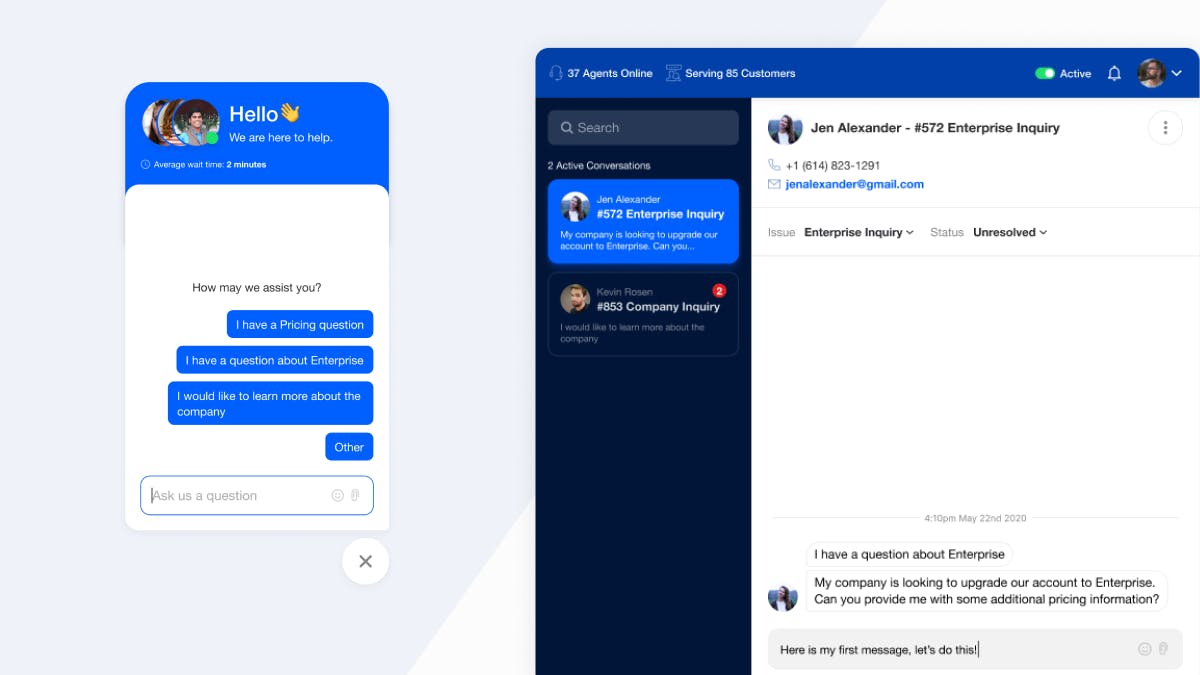Businesses face unique challenges when it comes to scaling enterprise live chat. While building basic messaging functionality with just a couple hundred users may be relatively straightforward for nimble startups, as apps acquire thousands, hundreds of thousands, and even millions of users, live chat performance suffers without the right tech stack.
Even minor performance issues such as increased latency can have massive implications for mission-critical metrics such as retention, churn, and satisfaction rates. With over 5 million apps vying for consumers’ attention, users expect their apps or real-time customer support to optimally work 100% of the time. Even just one unreceived message, slow experience, or unanswered question on live chat is enough for users to uninstall an app from their device, or stop using a product.
Here are the top challenges enterprises face when scaling live messaging, and why integrating a third-party enterprise live chat API solution mitigates these hurdles.
1. Live Chat Data & Security Protection
Data security concerns affect user platforms of all sizes. But enterprise apps with hundreds of thousands of users present a larger target for cybercriminals. As apps scale, it’s vital for enterprises to pay more attention to securing their user’s message content, and comply with data protection regulations. For example, enterprise live chat use cases for a fintech customer support service may require the exchange of sensitive personal information such as social security, banking, and routing numbers, or addresses and phone numbers. It’s essential that malicious actors cannot access this data.
At a minimum, message content should be encrypted in-transit via Transport Layer Security (TLS) and Secure Sockets Layer (SSL) cryptographic protocols. TLS/SSL ensures that secure connections between clients and servers are created to prevent the transited information from being read by an external third party. Increasingly, users are seeking messaging experiences that are end-to-end encrypted, meaning the only people who can read the messages are the people communicating — not even the company that runs the messaging service. Rather than building such technology from scratch, enterprises can achieve end-to-end encryption by using a security framework such as Apple’s CryptoKit or Virgil Security’s E3Kit with an enterprise-grade live chat SDK that includes ready-made networking and UI components.
Enterprises should also seek live chat solutions from tech providers that value data security and protection. Choose a vendor who has achieved security verification and compliance for GDPR, HIPAA, Privacy Shield Framework, SOC 2 Type II, and ISO 27001.
2. Live Chat Support & Maintenance
Even small delays in chat performance can lead to annoyed users and customers, and reduced brand credibility. That’s why anticipating outages, bugs, and problems is paramount for scaling enterprise live chat. Using an enterprise-grade live chat API with a dedicated support staff and established processes to prevent scalability-related performance hiccups is one of the best ways to ensure your app’s reliability.
Look for vendors that adequately provision redundant servers with resources to maintain uptime and a usable latency. Also look for third-party live chat providers that use tools to identify possible integration issues with your chat feature early on (such as opening more than one WebSocket for a single user). Providers that offer onboarding services, audit logs, and a dedicated shared Slack channel with their customer success teams ensure that your enterprise app or customer support service can scale without a hitch.
3. Features & Enterprise-Specific Pricing Structures
It can be tempting for enterprise developers to build a chat app with a provider such as Firebase, a multi-use tool for developers to build apps quickly, or Socket.io, a real-time open-source communications solution. While both options can work well for startup MVPs to prove a concept or handle a small number of users, both Firebase and Socket.io deliver barebones chat functionality with none of the polished features today’s live chat users expect, such as typing indicators, user presence, URL previews, threads and reactions, built-in throttling for popular live streams, and more.
Additionally, chat apps or live chat customer support solutions built using tools such as Firebase and Socket.io are inadequate for scaling, as pricing structures quickly balloon to unreasonable levels as more users sign on. Optimal third-party chat providers offer solid infrastructure and custom enterprise live chat pricing to plan for future growth.
Choosing an Enterprise Live Chat API for Scaling
Anticipating the future needs of an enterprise live chat feature is key to preventing performance, security, support, and pricing problems down the road. There is little more frustrating than investing in live chat architecture early in your product roadmap only to have to migrate to a different framework once you start to scale and acquire more users.
If you decide to integrate a messaging API into your app for live chat functionality, partner with a company that has advanced chat infrastructure (APIs built on languages such as Golang and Elixir are more capable of handling millions of WebSockets than tools built on Node and Python), and a proven track record of supporting a billion end users.
Ready to see how the Stream Chat API can help your enterprise business grow? Activate your free Chat Trial today.

